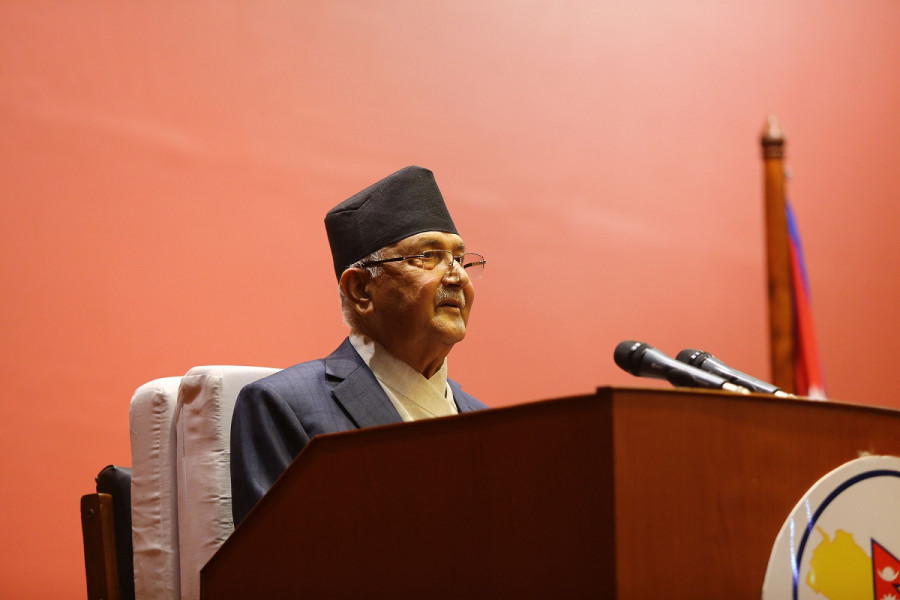National
When Oli speaks before Parliament, there is no telling what he will say
Political commentators say the prime minister tends to address Parliament like he is speaking to his party cadres, veering off topic, cracking jokes and even ridiculing others.
Binod Ghimire
Prime Minister KP Sharma Oli likes to ramble. His public persona is that of a people’s person, someone who cracks jokes, makes off-hand remarks and is always ready with an ukhan-tukka, a folksy saying. That style of public speaking had endeared him to the public even while masking the very serious consequences of his statements.
Oli’s style of speaking might have been tailor-made for the political circuit but in Parliament, it has wasted time and put a damper on the House business, say political analysts. Oli tends to ramble for hours and veer off topic, often resorting to lectures on subjects he personally knows little about.
Hari Roka, a political commentator, said that Oli doesn’t seem to differentiate between Parliament and party meetings.
“In most cases, Oli is wasting crucial parliamentary time making unnecessary statements that have no basis," Roka told the Post. “He doesn’t seem to care about parliamentary decorum.”
On June 10, Oli got up before the House of Representatives to answer queries on the new budget, but instead, he spent a significant amount of time talking about the coronavirus and the “immunity” of Nepalis.
When opposition lawmaker Gagan Thapa questioned Oli, asking him for the scientific evidence behind his claims, Oli openly ridiculed a sitting Member of Parliament, and his party members laughed. Public health experts have categorically denied any medical or scientific basis for Oli’s claims that Nepalis have stronger immune systems.
Again, a week later, when he appeared before the National Assembly on Thursday, Oli once again veered off topic for over two hours and made more unsubstantiated claims about the benefits of turmeric, ginger and garlic and how their consumption would prevent Covid-19. There is, once again, no evidence that turmeric, ginger or garlic ward off Covid-19, although they do have proven health benefits.
According to former House speaker Tara Nath Ranabhat, it is the responsibility of the Speaker to rein in the prime minister if he doesn’t stick to his point. But Speakers generally loathe to call out the prime minister for two reasons, said Ranabhat. One, it is expected that the executive head of the country will not make unsubstantiated comments, and two, Speakers are afraid of angering the prime minister, who is often their party boss. Prime ministers usually hold higher positions in the party and Speakers return to party politics after their five-year tenure is over.
“Ours is not a mature democracy, nor do we have a long parliamentary history. We, therefore, see Speakers staying loyal to the prime minister of the party they belong to,” Ranabhat told the Post.
Ranabhat said that the prime minister, while speaking in Parliament, needs to understand that he is not just addressing lawmakers but also the citizenry and even international observers.
“The way Oli speaks in Parliament might suit his personality but it doesn’t suit the executive head of Nepal,” he said.
Political analysts too say that addressing Parliament is markedly different from speaking before party cadres. Members of Parliament generally have specific queries and require focussed, evidence-based discussions rather than political speech-making.
“But Oli seems to be guided by the perception that controversial remarks are necessary to command attention,” said Krishna Pokharel, a Tribhuvan University professor of Political Science. “However, it is true that when speaking in Parliament, one must focus on what they are trying to say.”
Oli often arrives at Parliament with sheafs of notes but he doesn’t read off a script and tends to improvise as he goes along. This can lead to the prime minister getting sidetracked for an hour, rambling about something that struck his head rather than what he came to discuss.
But Pokharel too agreed with Ranabhat, saying that rather than an Oli problem, this is a problem with the immaturity of Nepal's parliamentary practice, which is largely to be expected since no Parliament has functioned smoothly in recent memory and no government has served its full term.
“It is a tragedy that there have been some prime ministers who tried to avoid the House,” said Pokharel. “And then there are those like Oli who can’t seem to stop making unnecessarily long speeches.”




 21.12°C Kathmandu
21.12°C Kathmandu















